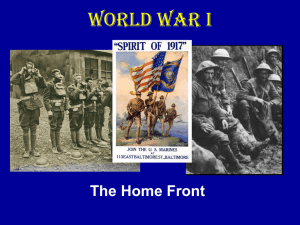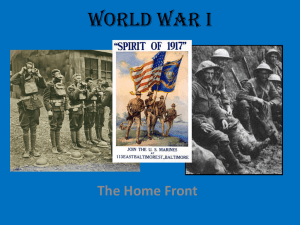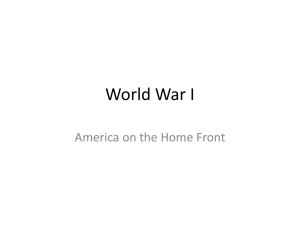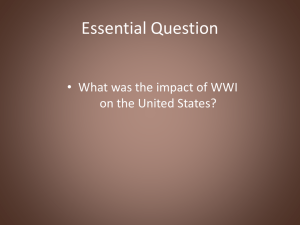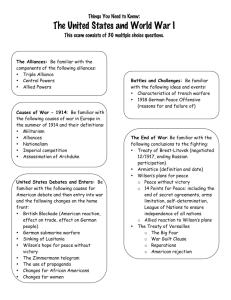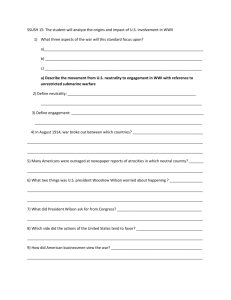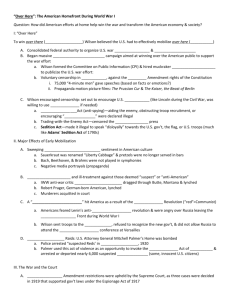Chapter 12: Section 4
advertisement
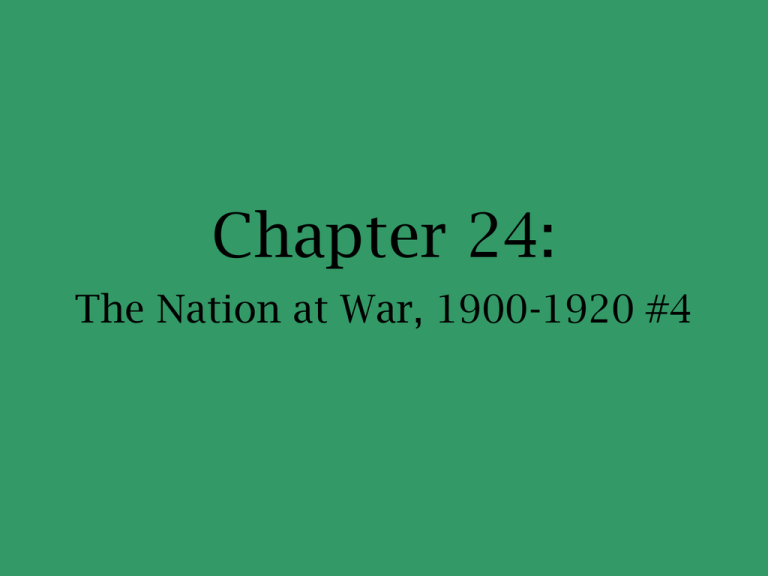
Chapter 24: The Nation at War, 1900-1920 #4 Over Here • victory at the front depended on economic and emotional mobilization at home • Wilson – moved quickly in 1917 and 1918 to organize war production and distribution • also recognized the need to enlist American emotions – the war for people’s minds, the “conquest of their convictions” was as vital as events on the battlefield • “I hate war, because war is murder, desolation and destruction. If one-tenth of what has been spent on preparedness for war had been spent on the prevention of war the world would always have been at peace.” – Henry Ford: August 12, 1915 • Ford vowed that he would burn down his factories before allowing them to make goods for the war in Europe – two years later, Ford was building tanks, tractors, and anti-submarine ships for the war effort • The Conquest of Convictions – to enforce loyalty, the government challenged media influences that threatened the war effort • Committee on Public Information – created to rally popular support for the war – recruited thousands of people in the arts, advertising, and film industries to publicize the war – news and information came under federal control » system of voluntary censorship of the press, plastered walls with colorful posters, and issued more than 75 million pamphlets • 75,000 “four-minute men” – gave quick speeches at public gatherings and places of entertainment on “Why We Are Fighting” and “The Meaning of America” – Germans were to be depicted as bloodthirsty Huns bent on world conquest • CPI Films like – The Prussian Cur and The Kaiser, the Beast of Berlin • CPI also created a Division of Industrial Relations – to rally labor to the war • “Hate the Hun!” – helped along by the propaganda campaign, anti-German sentiment and general hostility toward Germans spread rapidly • “liberty cabbage” – sauerkraut • “liberty measles” – instead of German measles • Salisbury steak – instead of hamburger • “police dogs” – instead of German shepherd • orchestral works by German composers were no longer played – many schools stopped offering instruction in the German language – German Americans and antiwar figures were badgered, beaten, and in some cases killed • Fear of Foreigners Mata Hari – fear of espionage (spying) • believed there were plans for turning Americans against the Allies and disrupting the American economy A homing pigeon outfitted for World War I espionage. – National Security League – preached “100 Percent Americanism” and pushed for literacy tests for immigrants • Repression of Civil Liberties – Espionage Act of 1917 – made it illegal to interfere with the draft • imposed sentences of up to twenty years in prison for persons found guilty of aiding the enemy, obstructing recruitment of soldiers, or encouraging disloyalty – allowed the postmaster general to remove from the mail materials that incited treason or insurrection – Trading-with-the-Enemy Act of 1917 – authorized the government to censor the foreign language press • Sedition Act (sedition – any speech or action that encourages rebellion) • made it illegal to obstruct the sale of Liberty Bonds or discuss anything “disloyal, profane, scurrilous, or abusive” about the American form of government, flag, the Constitution, or the army and navy – actually violated the First Amendment • sedition laws clearly went beyond any clear or present danger – government wanted to promote unity – by force, if necessary – to convince Germany that the nation was united behind the war • conservatives tried to stamp out American socialists – harried the Socialist party and the Wobblies • Industrial Workers of the World – would win new supporters from western miners, migrant farm workers, and unskilled laborers – goal of overthrowing capitalism and tried to interfere with copper mining during the war • Wilson’s postmaster general banned from the mail more than a dozen socialist publications, including the Appeal to Reason (a weekly socialist newsletter) • Eugene V. Debs – would be convicted for violation of the Espionage Act and spent the war in a penitentiary in Atlanta – would be nominated for president in 1920 and as prisoner 9563 won nearly a million votes • war also gave rise to the great “Red Scare” that began in 1919 – Americans feared Lenin’s anti-capitalist program and were against his decision in early 1918 to make peace with Germany, because it freed German troops to fight in France • Wilson would help in some anti-Bolshevik activities – he and others hoped to bring down the fledgling Bolshevik government • were afraid that it would spread revolution around the world • Wilson – after sending troops to the Soviet Union would also join in an economic blockade of Russia, send weapons to anti-Bolshevik insurgents, and refuse to recognize Lenin’s government – blocked Russian participation in the peace conference that ended the war • American willingness to interfere soured RussianAmerican relations for decades to come • A Bureaucratic War – Wilson and Congress set up an array of new federal agencies – agencies drew on funds and powers of a then unknown scope • Financing the War • to raise money the administration sold Liberty Bonds – special war bonds to support the Allied cause – could later be redeemed for the original value of the bonds plus interest • sold about $23 billion – “Every Scout to Save a Soldier” • Boy Scouts and Girl Scouts set up booths on street corners and sold bonds What country represented the ‘Menace of the Seas’? What was their weapon of choice? • also used the new 16th Amendment to raise taxes on corporations and personal incomes – taxes would bring in about $10 billion more to help pay for the war • ways that civilians could support Americans at the front and demonstrate their patriotism Managing the Economy • government called on industry to switch from producing commercial goods to war goods • Wilson created new agencies to manage the change • Wilson moved to create a series of highly centralized planning boards, each with broad authority over a specific area of the economy – were boards to control virtually every aspect of transportation, agriculture, and manufacturing – would coordinate the war effort to some degree • New Agencies – War Industries Board • oversaw the nation’s warrelated production in all American factories • was led by Bernard M. Baruch • determined priorities, allocated raw materials, and fixed prices • told manufacturers what they could and could not make – War Trade Board • oversaw foreign trade by licensing trade and punished firms suspected of dealing with the enemy • Regulating Food and Fuel Consumption – Lever Food and Fuel Control Act – gave the President power to manage the production and distribution of foods and fuels vital to the war effort – Herbert Hoover – head of the Food Administration to supply food to the armies overseas • promoted the “spirit of self-sacrifice” – convinced people to save food by observing “meatless” and “wheatless” days • fixed prices to boost production, bought, and distributed wheat, and encouraged people to plant “victory gardens” behind homes, churches, and schools • price controls – system of pricing determined by the government, on the sale of food • sent campaigners to get housewives to sign cards pledging their cooperation – rationing – distributing goods to consumers in fixed amounts • voluntary restraint and increased efficiency • women played a key role in the Gospel of the Clean Plate – “Stop, before throwing any food away, and ask ‘Can it be used?’ … Stop catering to different appetites. No second helpings. Stop all eating between meals … One meatless day a week. One wheatless meal a day. … No butter in cooking: use substitutes.” » Herbert Hoover – Fuel Administration – sponsored gasless days (when motorists could not drive) to save fuel, created daylight saving time, rationed coal and oil • daylight saving time – turning clocks ahead one hour for the summer – increased working daylight hours – reduced the need for artificial light – lowered fuel consumption • shut down nonessential factories one day a week to save coal • Railroad Administration – dictated rail traffic over nearly 400,000 square miles of track – standardizing rates, limiting passenger travel, and speeding arms shipments • War Shipping Board – coordinated shipping • Emergency Fleet Corporation – supervised shipbuilding • government was intervening in American life like they never had before • those who gave their service for a token salary, were called “dollar-a-year” men and women – businessmen were paid a nominal dollar a year • flocked to Washington to run the new agencies • partnership between government and business grew closer • Labor in the War – war also brought organized labor into partnership with the government – Samuel Gompers – served on the Council of National Defense – an advisory group formed to unify business, labor, and government • Gompers a leading labor leader had promised that unions would work with the war effort • formed a War Committee on Labor to enlist workers’ support for the war • hoping to encourage production and avoid strikes, Wilson adopted many of the objectives of the social-justice reformers – supported an 8-hour day in war-related industries – improved wages and working conditions • National War Labor Board (WLB) - worked to settle any labor disputes that might disrupt the war effort – protected the right of labor to organize and bargain collectively – did not forbid strikes, it used various tactics to discourage them • War Labor Policies Board set standards for wages, hours, and working conditions in the war industries • WLB also ordered that women be paid equal wages for equal work • after the draft, there was a labor shortage, filled by women, African Americans, and Mexican Americans • as wages increased, so did expectations – some became more militant, and conflict grew between women and male coworkers • a Women’s Bureau was established in the Department of Labor – but government influence varied • corporations found a major source of labor in southern blacks – northern labor agents traveled across the South – promising jobs, high wages, and free transportation • the movement northward became a flood • men found jobs in factories, railroad yards, steel mills, packinghouses, and coal mines • black women worked in textile factories, department stores, and restaurants – found greater racial freedom but also different living conditions • blacks were also more and more inclined to fight back – returning home, they expected better treatment • “Lift Ev’ry Voice and Sing” – became the “Negro National Anthem” • W.E.B. DuBois – spoke of a “New Negro,” proud and more militant • in the Southwest, eager for cheap labor – farmers and ranchers persuaded the federal government to relax immigration restrictions – more than 100,000 Mexicans migrated and created urban barrios similar to the Chinatowns and Little Italy’s around them • business profits grew, factories expanded, and industries turned out huge amounts of war goods • government authority swelled and people began to expect different things from their government • US – emerged from the war the strongest economic power in the world – 1914 – it was a debtor nation – 1919 – had became a creditor nation • war marked a shift in economic power rarely equaled in history Changing People’s Lives • American patriotism and war fever made military styles and activities more acceptable at home – military drill was put in place at many schools and universities – children joined scouting programs that featured military-style uniforms, marching, and patriotic exercises • Social Mobility for Minorities and Women – war virtually stopped the flow of immigrants – armed forces had taken many young men out of the labor pool – Great Migration – African Americans moving out of the South – created new opportunities for women • Women’s Land Army – 400,000 women joined the industrial workforce
